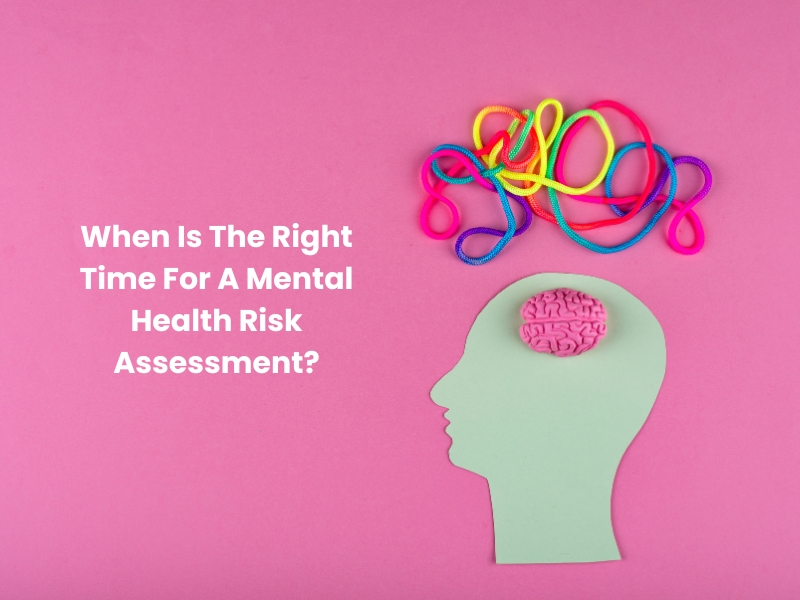Mental health is a crucial aspect of overall well-being. Just like you care for your physical health, monitoring and addressing your mental health is equally important. A mental health risk assessment is a valuable tool for identifying potential issues early on and seeking appropriate support. This guide will explore a mental health assessment, why it’s essential, and when to consider one.
What is a mental health risk assessment?
It is a process used to evaluate an individual’s likelihood of experiencing mental health problems. It involves gathering information about their history, current situation, and any concerning symptoms. A mental health professional, such as a psychologist or counsellor, can conduct this assessment.
Why is evaluating mental health risks significant?
Assessing mental health risks is crucial for several reasons:
- Early intervention: Mental health awareness is vital to Australia’s health system. By identifying problems early through regular assessments, healthcare providers can intervene before they develop into more severe conditions.
- Personalised care: Each person’s mental health journey is unique, and an assessment helps create a care plan tailored to individual needs.
- Safety and well-being: Mental health risk assessments help protect individuals from harm by identifying potentially dangerous situations, whether it’s self-harm, harm to others, or neglect.
- Holistic care: Mental health assessments consider various aspects of an individual’s life, including personal, social, and psychological factors.
When should you consider a mental health risk assessment?
There are several situations where a mental health risk assessment may be beneficial:
- Concerns about your child’s mental health: If you’re worried about your child’s emotional well-being, a mental health professional can conduct a risk assessment to identify any potential issues.
- Experiencing significant stress or challenges: If you’re experiencing a difficult time, such as a job loss, relationship breakup, or essential life change, a risk assessment can help you understand how it’s affecting your mental health.
- Noticing changes in your behaviour or mood: If you’re experiencing unusual symptoms like excessive worry, sadness, irritability, or difficulty concentrating, it’s worth exploring whether they might be related to underlying mental health issues.
- Family history of mental health conditions: If you have a family member with a mental health disorder, you may be at increased risk. A risk assessment can help you understand your vulnerability.

How can you recognise the signs that you need help?
It can sometimes be challenging to recognise the signs that you need help with your mental health. Here are some common indicators:
- Consistent feelings of gloom or despair
- Diminished interest in previously enjoyable activities
- Altered eating habits or sleep patterns
- Challenges with focus or decision-making
- Feelings of worthlessness or guilt
- Reckless behaviour
- Thoughts of self-harm or suicide
If you’re experiencing any of these symptoms, seeking professional help is essential.
What are the advantages of an early risk evaluation?
Early intervention can have significant benefits, including:
- Reduced severity of symptoms: Addressing mental health issues early on can help prevent them from worsening.
- Improved quality of life: Effective treatment can lead to better relationships, increased productivity, and overall satisfaction with life.
- Prevention of more serious problems: Early intervention can help prevent the development of more severe mental health conditions, such as substance abuse or psychosis.
Can this type of assessment be done in the workplace?
Yes, mental health risk assessments can be conducted in the workplace. Many organisations recognise the importance of employee mental health and implement programs to support their well-being. These programs may include regular check-ins, stress management workshops, and access to mental health professionals.
What steps are involved in conducting a mental health risk assessment?
A mental health risk assessment typically involves the following steps:
- Gathering information: The professional will collect information about your personal history, family history, and current symptoms.
- Conducting an interview: You will be asked questions about your thoughts, feelings, and behaviours.
- Administering assessments: You might need to complete questionnaires or psychological tests.
- Making a diagnosis: Based on the information gathered, the professional will determine whether you are at risk for a mental health condition.
Who can help you with a mental health risk assessment?
A variety of mental health professionals can conduct risk assessments, including:
- Psychologists: These professionals specialise in diagnosing and treating mental health conditions.
- Counsellors: They guide and support individuals with various life challenges, including mental health issues.
- Social workers: Social workers help individuals navigate social systems and access resources that can benefit those with mental health concerns.
- Psychiatrists: Psychiatrists are medical doctors who specialise in diagnosing and treating mental health conditions. They can prescribe medications and provide psychotherapy.

How often should you reassess your mental health risks?
Mental health is not static, so it’s essential to reassess risks periodically. It would be best if you considered re-evaluation:
- After significant life changes: Following events like job loss, moving, or the death of a loved one.
- When new symptoms arise: If you experience new or worsening symptoms.
- Every 6 to 12 months: Regular check-ins ensure that you’re on track and that any issues are addressed promptly.
What should you do after completing an evaluation?
If you’re found to be at risk for a mental health condition, your professional will discuss treatment options with you. These may include therapy, medication, or a combination of both. It’s important to follow your treatment plan and monitor your mental health.
Invest in your mental well-being!
At Auburn Health Centre, we understand the importance of mental health and are committed to providing personalised risk assessment services. Our experienced team of mental health professionals offers a range of services, including:
- Counselling: Our counsellors provide a safe and supportive space for individuals to explore their thoughts, feelings, and behaviours.
- Psychology: Our psychologists offer evidence-based interventions to address various mental health conditions.
- Occupational therapy: Our occupational therapists help individuals develop skills to manage daily activities and improve their quality of life.
If you’re concerned about your mental health or need support, please don’t hesitate to contact Auburn Health Centre. We’re here to help you on your journey to well-being.


